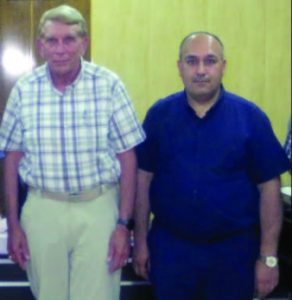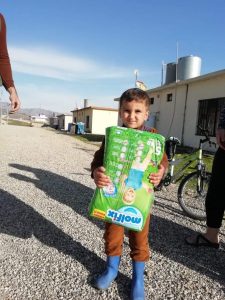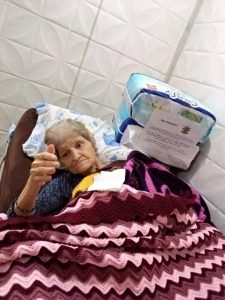Just as it did during most of 2020 the Covid-19 pandemic continues to create both physical and financial barriers to our programs to help persecuted Christians.
In my work to serve the victims of radical Islam, the need is so great and my time and resources are stretched thin.
Restrictions caused by the coronavirus have caused even more stress on our systems to distribute aid to persecuted Christians.
Since March of last year our ministry partners in Iraq have had great difficulty delivering adult diapers to those who have critical needs and cannot leave their homes, including the elderly and those wounded during Islamic State attacks.
Our operations in Erbil have been forced to shut down and we are now working with partners in Duhok, which is north of Erbil.
Duhok, a city of 1.5 million, is the center of Assyrian Christian culture but now has scores of empty churches, as Christians have been forced to abandon the area over the last several decades.
Many Christians are in poverty, having had their homes and businesses destroyed by the Islamic State.

Many of those in need in Duhok are from the same Christian towns as those who also fled to Erbil. They are displaced in their own homeland.
There is no Medicare or Medicaid in Iraq, and there is no social security for the elderly. Many older Christians, particularly women whose sons were killed by the Islamic State, have no one to support them. They must seek out charity for their needs.
The Christian community in Iraq has been badly broken by the continued attacks since the first Gulf War. The Islamic State destroyed Christian families and homes, and the Muslim controlled Iraqi government does little to help Christians rebuild. Then came Covid-19!
One church we were working with in Duhok was hit hard by Covid-19 and had to suspend operations. Medical care had already been poor in Iraq, before Covid-19 completely overwhelmed the hospitals.
My good friend Ashur Eskrya, who was president of the Assyrian Aid Society, died due to Covid-19 in April. His organization was one of those assisting in the distribution of diapers.
As bad as Covid-19 is in Iraq, we still managed to distribute about 10,000 adult diapers monthly to special needs elderly adults and 50,000 diapers monthly to destitute families with infants.

Each month the reports from Duhok arrive on my desk, with the stories of special needs adults that break my heart.
Often, along with the reports are photos that I just cannot share here, such as one of a man whose feet had turned black from lack of proper medical care.
There are still lockdowns in Iraq. Hopefully those lockdowns will end this year.
When the lockdowns finally end, it is important that we have in place the financial resources to reach the special needs adults, including those gravely wounded by Islamic terror.
Young families are financially worse off than ever as the Christian population continues to shrink in Iraq. Parents with babies and toddlers have returned to their ancestral homes on the Nineveh Plains to find factories and businesses destroyed.
What work there is goes to Muslim men, not Christians.
Iraqi and Syrian Christians have fled to Jordan.
There is still fighting in Iraq and the Sunni Muslim revolt is still ongoing in Syria.
Many of the Christian Iraqi and Syrian refugees we help in Jordan are not infants. Many of those receiving aid are elderly and have special needs. Because they are not Jordanian citizens, they receive no government aid.

Many we supply adult diapers to in Jordan are not elderly but were wounded in terror attacks or are extremely ill. Mrs. Al-Daoud, an elderly woman now living in Safout, Jordan had a stroke during an attack that caused her paralysis, and she is unable to move.
Mrs. Al-Daoud is not a citizen of Jordan and receives no government aid. We supply adult diapers and wet wipes to her continuously. Without state aid she must rely upon an unemployed daughter who came with her for all her needs.
Despite the Covid-19 lockdowns we are able to continuously supply diapers to 97 special needs Christian adults, most of them elderly but some younger who are paralyzed.
Up until Covid-19 began to sweep across the world the Diapers for Refugees program was growing in Jordan and Iraq.
During 2019 we were able to increase the size of the program, so the cost per diaper went down. The more diapers we are able to buy at one time, the less each diaper costs!
The bad news is that our funding has become tighter as the coronavirus has affected the incomes of the vast majority of Americans.
In 2019 we were able to deliver over two million diapers to toddlers, infants and special needs adults. In 2020 our totals were down to one million, but our costs per diaper increased.
William J. Murray, President
